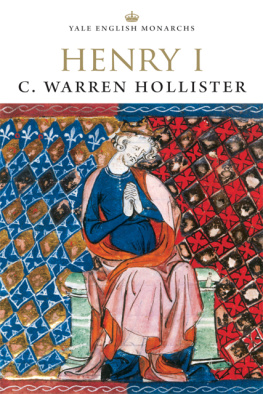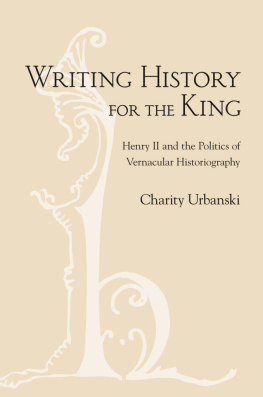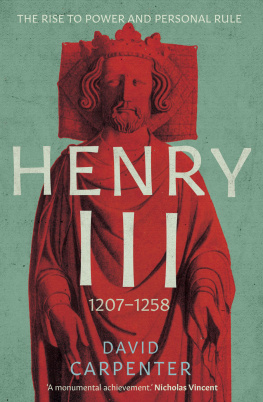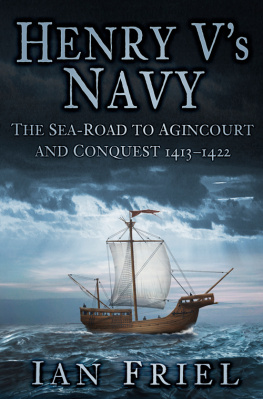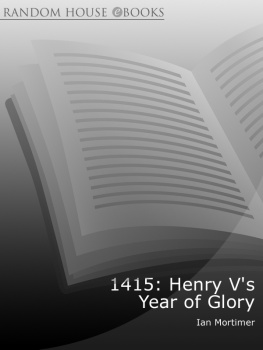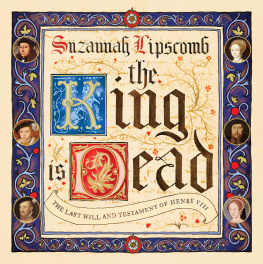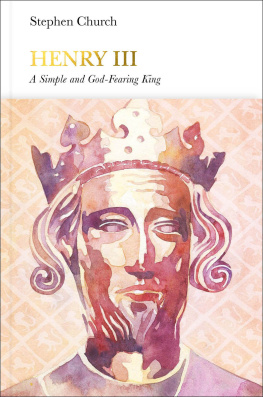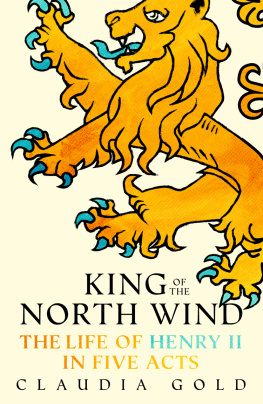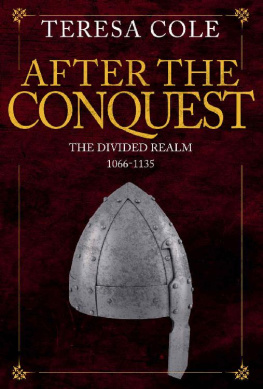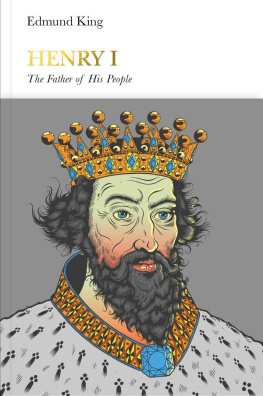
Also in the Yale English Monarchs Series
ATHELSTAN by Sarah Foot
EDWARD THE CONFESSOR by Frank Barlow
WILLIAM THE CONQUEROR by David Douglas
WILLIAM RUFUS by Frank Barlow
HENRY I by Warren Hollister
KING STEPHEN by Edmund King
HENRY II by W. L. Warren*
RICHARD I by John Gillingham
KING JOHN by W. L. Warren*
EDWARD I by Michael Prestwich
EDWARD II by Seymour Phillips
RICHARD II by Nigel Saul
HENRY V by Christopher Allmand
HENRY VI by Bertram Wolffe
EDWARD IV by Charles Ross
RICHARD III by Charles Ross
HENRY VII by S. B. Chrimes
HENRY VIII by J. J. Scarisbrick
EDWARD VI by Jennifer Loach
MARY I by John Edwards
JAMES II by John Miller
QUEEN ANNE by Edward Gregg
GEORGE I by Ragnhild Hatton
GEORGE II by Andrew C. Thompson
GEORGE III by Jeremy Black
GEORGE IV by E. A. Smith
Available in the U.S. from University of California Press

Copyright 2001 by The Estate of C. Warren Hollister
Foreword 2001 by Jeffrey Burton Russell
Preface 2001 by Amanda Clark Frost
First published in paperback 2003
All rights reserved. This book may not be reproduced in whole or in part, in any form (beyond that copying permitted by Sections 107 and 108 of the U.S. Copyright Law and except by reviewers for the public press) without written permission from the publishers.
For information about this and other Yale University Press publications, please contact:
U.S. Office:
Europe Office:
Set in New Baskerville by Best-set Typesetter Ltd, Hong Kong
Printed in Great Britain by Hobbs the Printers Ltd, Totton, Hampshire
A catalogue record for this book is available from the
Library of Congress and the British Library
ISBN 978-0-300-08858-8 (hbk.)
ISBN 978-0-300-09829-7 (pbk.)
3 5 7 9 10 8 6 4
For Edith
CONTENTS
FOREWORD
At last the definitive account of the reign of Henry I (11001135) appears in the English Monarchs Series published by Yale University Press. Its author, C. Warren Hollister (19301997), began working on the project in 1962, when the eminent Anglo-Norman historian Professor David Douglas recommended him as Henry's biographer for the series. Long in the making, the book was delayed by the great Santa Barbara fire of 1990, in which, as Hollister wrote to his editor, among our losses were the hard and floppy disks and the printout of my Henry I MS, my entire research library, and all my research note cards. Discouraged only briefly, Hollister resumed writing a final draft of the book during a leave of absence in Brittany in 1994. He had completed a provisional draft of eight and a half chapters together with an outline for the remainder by 1997, and it had been his hope and intention to complete all eleven chapters soon afterward. His death sadly intervened, but not (if I may be permitted) fatally, for Hollister's former student in the field of Anglo-Norman church history and later an editor for the University of California Press, Dr Amanda Clark Frost, undertook the completion of the work at his request. She painstakingly edited the completed chapters and proceeded to finish the remaining chapters according to Hollister's outline. Dr Frost's knowledge, skill, perseverance, patience, accuracy, thoroughness, and clear style have made the book as close as humanly possible to what Professor Hollister would have wanted. It would not exist without her.
Hollister's lifework on Henry I has altered our perceptions of that king. The year before he died, he published an article in Peritia 10 (1996): The Rouen Riot and Conan's Leap. It typifies his vigorous style, penchant for entertaining while instructing, and ability to tease out varieties of meaning from a peculiar event. Why did the future King Henry I cause a fellow named Conan to be hurled out the window to his death during the Rouen riot of 1090? Because, Hollister convinces the reader, Henry was a capable, responsible ruler devoted to making peace both in Normandy (as the date suggests) and in England after becoming king in 1100. Long remembered for his unrestrained sexuality and his cruelty, Henry will now be understood (despite his undeniable faults) chiefly as a great peacemaker on both sides of the Channel. In some thirty articles Hollister proved over and again that Henry's administrative sophistication was unmatched in early twelfth-century Europe.
Hollister not only set out a new view of Henry I but also advanced the concept of administrative kingship: government through standard bureaucratic forms, professional administrators, and a series of institutions linking localities to the center. Even more important, Hollister bridged not only the Conquest but also the Channel. He became internationally famous for studies that emphasized the interrelationship of England and Normandy, two fields usually treated as separate subjects. Out of English history and French history, he made the field of Anglo-Norman history, now established and recognized everywhere.
Before devoting himself to the study of Henry I, Professor Hollister wrote extensively on Anglo-Saxon and Anglo-Norman military institutions. His books Anglo-Saxon Military Institutions on the Eve of the Norman Conquest (Oxford, 1962), which won the Triennial Book Prize of the Conference on British Studies, and The Military Organization of Norman England (Oxford, 1965) established the young scholar as a brilliant and precocious student of both sides of the Anglo-Norman divide. His choice of subjects was courageous, as English historians had been debating the nature of military, governmental, and administrative institutions for more than a century. His first book, about the fyrd, was a brave piece of scholarship by a young, unknown American, challenging the previous work of some eminent British scholars. The good sense of Hollister's arguments and the clarity of his prose won him and his theories admirers and then friends. By the mid-1960s, he was one of the few American historians of medieval Britain treated as an equal by English academics.
Professor Hollister was a Fellow of the Medieval Academy, of the Royal Historical Society, and of the Medieval Academy of Ireland; he was President of the North American Conference on British Studies, of the International Charles Homer Haskins Society, and of many other organizations. His fellowships and grants included two Fulbrights, a Guggenheim, two ACLS fellowships, and a Borchard Research Fellowship to Brittany. He received the Triennial Prize and the Walter D. Love Memorial Prize, and he was the youngest person ever (to date) to be named Faculty Research Lecturer at the University of California, Santa Barbarathe highest award that University of California faculty can bestow upon their peers.
Hollister graduated with honors from Harvard in 1951, served in the United States Air Force during the Korean War, and earned his Ph.D. at the University of California, Los Angeles, in 1958. He went on immediately to teach at the University of California at Santa Barbara, his one and only home institution, first as an Instructor (a rank, he wrote once with typical ironic humor, that has since been abolished on humanitarian grounds), and then up to, and beyond, the top of the University of California's arcane merit system. At the time of his official (though hardly actual) retirement in 1994 he was the most respected and highest ranked professor in the Humanities at UCSB.
Next page
